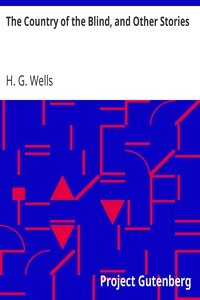The Country of the Blind, and Other Stories, H. G. Wells [top 10 books of all time TXT] 📗

- Author: H. G. Wells
Book online «The Country of the Blind, and Other Stories, H. G. Wells [top 10 books of all time TXT] 📗». Author H. G. Wells
XIV. — THE OBLITERATED MAN.
I was—you shall hear immediately why I am not now—Egbert Craddock Cummins. The name remains. I am still (Heaven help me!) Dramatic Critic to the Fiery Cross. What I shall be in a little while I do not know. I write in great trouble and confusion of mind. I will do what I can to make myself clear in the face of terrible difficulties. You must bear with me a little. When a man is rapidly losing his own identity, he naturally finds a difficulty in expressing himself. I will make it perfectly plain in a minute, when once I get my grip upon the story. Let me see—where am I? I wish I knew. Ah, I have it! Dead self! Egbert Craddock Cummins!
In the past I should have disliked writing anything quite so full of "I" as this story must be. It is full of "I's" before and behind, like the beast in Revelation—the one with a head like a calf, I am afraid. But my tastes have changed since I became a Dramatic Critic and studied the masters—G.A.S., G.B.S., G.R.S., and the others. Everything has changed since then. At least the story is about myself—so that there is some excuse for me. And it is really not egotism, because, as I say, since those days my identity has undergone an entire alteration.
That past!... I was—in those days—rather a nice fellow, rather shy— taste for grey in my clothes, weedy little moustache, face "interesting," slight stutter which I had caught in my early life from a schoolfellow. Engaged to a very nice girl, named Delia. Fairly new, she was— cigarettes—liked me because I was human and original. Considered I was like Lamb—on the strength of the stutter, I believe. Father, an eminent authority on postage stamps. She read a great deal in the British Museum. (A perfect pairing ground for literary people, that British Museum—you should read George Egerton and Justin Huntly M'Carthy and Gissing and the rest of them.) We loved in our intellectual way, and shared the brightest hopes. (All gone now.) And her father liked me because I seemed honestly eager to hear about stamps. She had no mother. Indeed, I had the happiest prospects a young man could have. I never went to theatres in those days. My Aunt Charlotte before she died had told me not to.
Then Barnaby, the editor of the Fiery Cross, made me—in spite of my spasmodic efforts to escape—Dramatic Critic. He is a fine, healthy man, Barnaby, with an enormous head of frizzy black hair and a convincing manner, and he caught me on the staircase going to see Wembly. He had been dining, and was more than usually buoyant. "Hullo, Cummins!" he said. "The very man I want!" He caught me by the shoulder or the collar or something, ran me up the little passage, and flung me over the waste-paper basket into the arm-chair in his office. "Pray be seated," he said, as he did so. Then he ran across the room and came back with some pink and yellow tickets and pushed them into my hand. "Opera Comique," he said, "Thursday; Friday, the Surrey; Saturday, the Frivolity. That's all, I think."
"But—" I began.
"Glad you're free," he said, snatching some proofs off the desk and beginning to read.
"I don't quite understand," I said.
"Eigh?" he said, at the top of his voice, as though he thought I had gone and was startled at my remark.
"Do you want me to criticise these plays?"
"Do something with 'em... Did you think it was a treat?"
"But I can't."
"Did you call me a fool?"
"Well, I've never been to a theatre in my life."
"Virgin soil."
"But I don't know anything about it, you know."
"That's just it. New view. No habits. No clichis in stock. Ours is a live paper, not a bag of tricks. None of your clockwork professional journalism in this office. And I can rely on your integrity——"
"But I've conscientious scruples——"
He caught me up suddenly and put me outside his door. "Go and talk to Wembly about that," he said. "He'll explain."
As I stood perplexed, he opened the door again, said, "I forgot this," thrust a fourth ticket into my hand (it was for that night—in twenty minutes' time) and slammed the door upon me. His expression was quite calm, but I caught his eye.
I hate arguments. I decided that I would take his hint and become (to my own destruction) a Dramatic Critic. I walked slowly down the passage to Wembly. That Barnaby has a remarkable persuasive way. He has made few suggestions during our very pleasant intercourse of four years that he has not ultimately won me round to adopting. It may be, of course, that I am of a yielding disposition; certainly I am too apt to take my colour from my circumstances. It is, indeed, to my unfortunate susceptibility to vivid impressions that all my misfortunes are due. I have already alluded to the slight stammer I had acquired from a schoolfellow in my youth. However, this is a digression... I went home in a cab to dress.
I will not trouble the reader with my thoughts about the first-night audience, strange assembly as it is,—those I reserve for my Memoirs,—nor the humiliating story of how I got lost during the entr'acte in a lot of red plush passages, and saw the third act from the gallery. The only point upon which I wish to lay stress was the remarkable effect of the acting upon me. You must remember I had lived a quiet and retired life, and had never been to the theatre before, and that I am extremely sensitive to vivid impressions. At the risk of repetition I must insist upon these points.
The first effect was a profound amazement, not untinctured by alarm. The phenomenal unnaturalness of acting is a thing discounted in the minds of most people by early visits to the theatre. They get used to the fantastic gestures, the flamboyant emotions, the weird mouthings, melodious snortings, agonising yelps, lip-gnawings, glaring horrors, and other emotional symbolism of the stage. It becomes at last a mere deaf-and-dumb language to them, which they read intelligently pari passu with the hearing of the dialogue. But all this was new to me. The thing was called a modern comedy, the people were supposed to be English and were dressed like fashionable Americans of the current epoch, and I fell into the natural





Comments (0)